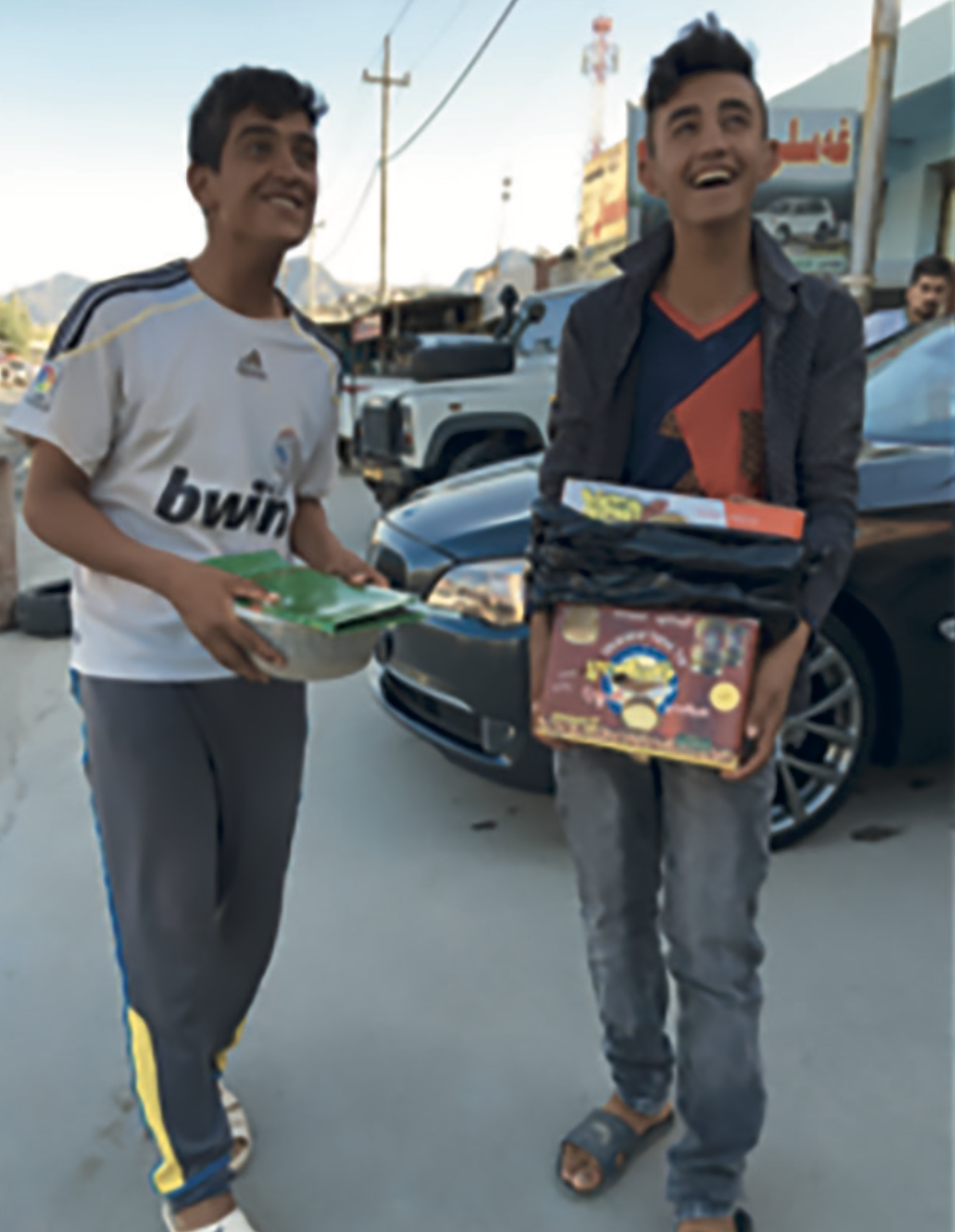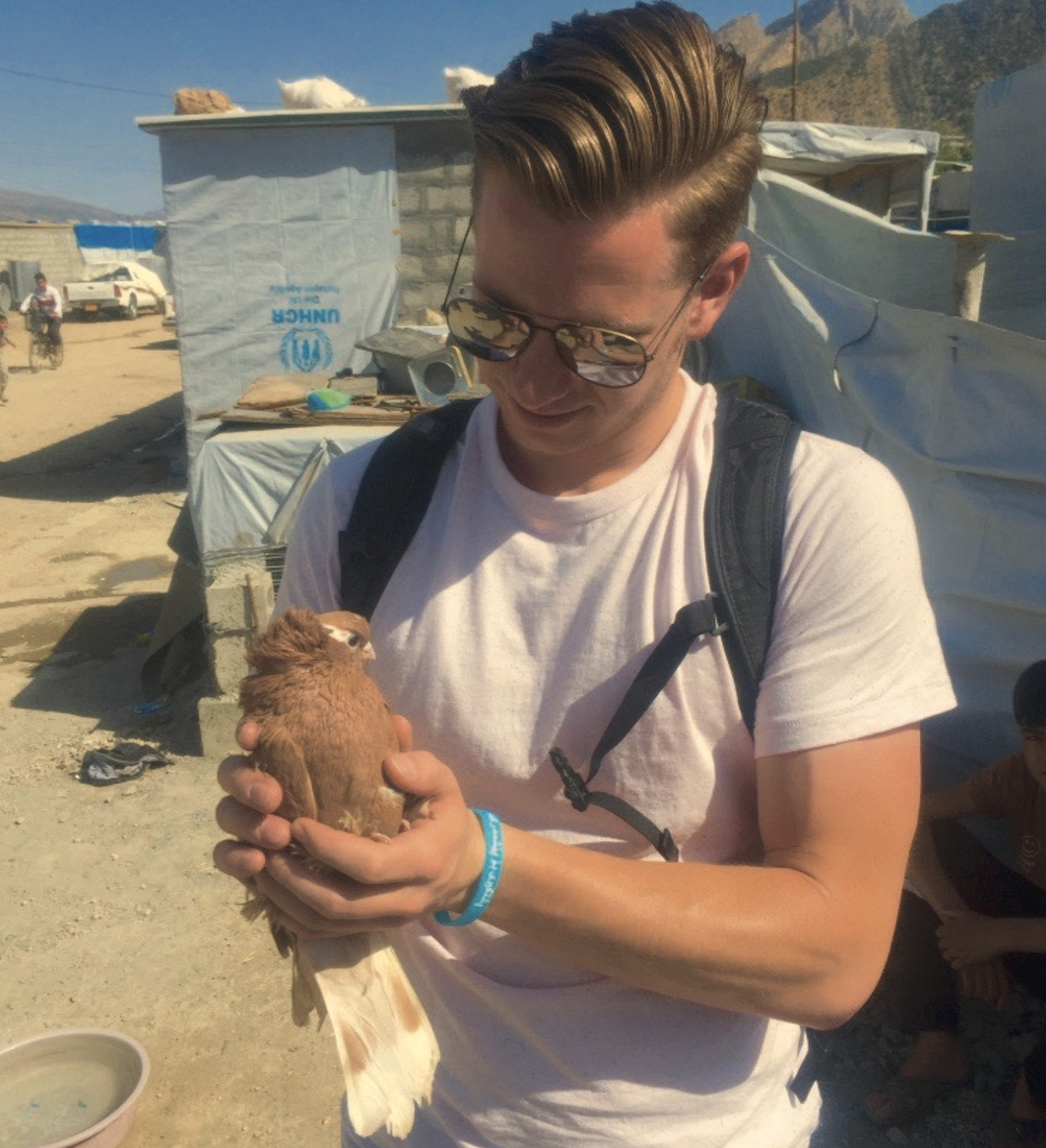Foreword
The so-called Islamic State of Iraq and Syria (ISIS) has committed the crime of genocide against the Yezidi people. The Yezidis, a non-Muslim Kurdish religious minority in northern Iraq, have been targeted by ISIS since the militant group took over large parts of Iraq and Syria. From their bases, ISIS stormed the Iraqi city of Sinjar on August 3, 2014, quickly capturing it and changing the lives of its Yezidi population forever. Tens of thousands of Yezidis were murdered while thousands more were taken captive, victimized by brutal and unspeakable acts of violence. Yezidi women have been forced into sex slavery, sold off as brides, and subjected to the worst kinds of physical and mental torture. Sinjar, home to a majority of the world’s Yezidi population, now lays in ruins.
Since its liberation from ISIS in November 2015, much of the city is uninhabitable. Even though the city is no longer under ISIS control, many Yezidi families still reside in camps within the borders of the Kurdish Region of Iraq. One of these places, Camp Rawanduz, is home to small group of Yezidi families who fled Sinjar in August 2014. They are hoping to return home.
It is here, on the outskirts of the small town of Rawanduz, that I encountered a young, displaced Yezidi boy named Emad. His unique love for birds inspired me to write this article and detail his story and the struggle of his people. My time spent with Emad and his friends in the hot summer months of 2016 opened my eyes to a whole new way of life and showed me the horrors that many only see through a television screen. It is through Emad that I can briefly tell the story of his people and the hope for their future.
Emad is a Yezidi, and this is his story.

Emad
Emad squats on a dusty cinderblock, hiding in the shadows from Iraq’s burning mid-afternoon sun. He sits and chews sunflower seeds, spitting the salty shells near his feet. Several of Emad’s pigeons wander back and forth in the shade near him, picking at small bits of seed and bread. Perched on his cinderblock in front of me, Emad and his birds are taking refuge not only from the sun, but also from the so-called Islamic State of Iraq and Syria (ISIS) in the mountains of the semi-autonomous Kurdish Region in northern Iraq. Emad is a Yezidi, and this is his story.
Emad is 16 years old and his raspy, high-pitched voice always carries with it a bit of sarcasm, even when I can’t understand his words. Along with 200 other Arabs and Yezidis, Emad lives in a small camp for internally displaced persons (IDPs) in a quiet town called Rawanduz, situated two hours north of Erbil, the capital city of the Kurdish Region of Iraq. Spitting out a few more sunflower seeds, Emad’s beloved birds softly coo and wander around in front of us. High in the mountains and far from his hometown of Sinjar, Camp Rawanduz is his new home.
While continuing to chew sunflower seeds, Emad’s shaded cinderblock seat lies next to a makeshift birdhouse. The small homemade enclosure is shaded by a faded blue United Nations tarp that protects the birds from the strength of the afternoon sun. Emad enjoys sitting with his birds, watching all eight of them eat and drink before letting them stretch their wings and fly above the camp. The love Emad has for his birds is unique, setting him apart from everyone else in Camp Rawanduz. Situated in the back of a small neighborhood, Camp Rawanduz is tucked nicely next to an abandoned stadium. Like the rest of the Yezidis in Camp Rawanduz, Emad also enjoys playing football. Once the sun falls low to the horizon, cooling the dusty summer air, you can find Emad running in the overgrown and abandoned stadium next to the camp with other Yezidis, all of whom are engaged in a competitive game of football. As the men run after each other and the young children play together on the sidelines, Emad’s birds soar through the evening air, flapping their wings high above the field below.
Sinjar
Sadly, these are not the same birds that he owned back in his hometown Sinjar. Emad’s previous birds are gone, and so is his former life. The sectarian violence that has engulfed Iraq since the rise of ISIS forced him to abandon his old birds, pushing his family out of its ancestral home in the Nineveh Plains and deep into the mountains of the Kurdistan Region. Based on a radical interpretation of Sunni Islam, ISIS established a self-proclaimed caliphate in areas under its control in Iraq and Syria. Since their rapid and brutal rise, ISIS has carried out a systematic and genocidal campaign of death and destruction, killing and enslaving thousands of Yezidis when it overran Emad’s city of Sinjar in August 2014.
It has been almost two years since Emad’s family and so many other Yezidi families in Sinjar were forced into exile. The ISIS offensive in August 2014 to capture the predominately Yezidi city forced Emad and thousands of others into the mountains just north of Sinjar. With no other choice but to flee, Emad and 200,000 Yezidis were able to escape death, violence, and sexual repression through a humanitarian corridor opened by the Kurdish peshmerga forces. Many were not so lucky, as between 2,000 and 5,000 Yezidi men, women, and children were murdered or enslaved by ISIS in what is now known as the Sinjar Massacre. Suffering from what has now been labeled genocide by the United Nations, the Yezidi people have since been thrust into the spotlight of the international community. Their persecution and suffering have become a rallying cry in the global fight against ISIS.

The Peacock Angel
The Yezidis are a previously unknown and ancient religious minority who exist mainly in Kurdistan. Worldwide, the Yezidi population numbers a little under one million, with an overwhelming majority living in northern Iraq. The Yezidi faith is an ancient, orally transmitted religion that predates Islam. Yezidism believes in one God who is represented by seven angels. The most important angel to Yezidis, Melek Tawous, or the Peacock Angel (Melek Tawous is represented as a peacock in Yezidi tradition) fell from heaven after refusing to bow to Adam. This defiance in the face of God caused Melek Tawous to be cast from Heaven and sent to Earth. After falling from God’s grace, Melek Tawous was later forgiven, returning to Heaven. Some extremists still unjustly equate the Yezidi veneration of Melek Tawous to devil worship, as Shaytan (the devil or ‘satan’ in Arabic and in Islam) also fell from Heaven after refusing to prostrate to Adam.
Enslavement
Further, the Yezidis do not have a written or sacred text such as the Bible, Qur’an, or Tor’ah. This allows ISIS to kill the Yezidis without remorse, as it is justified by their radical interpretation of the Qur’an. Unlike the Christians of northern Iraq, the Yezidis have faced the worst type of oppression from ISIS as they are not ‘People of the Book’. Subsequently, with the unjust label of devil worshippers, pagans, polytheists, and infidels for their veneration of the Peacock Angel, the Yezidis were faced with two options when ISIS took over Sinjar: conversion to Islam or beheading. Those who weren’t executed included many Yezidi women and young girls who were given as prizes and brides for fighters. Girls as young as 11 were raped repeatedly, given a monetary value, and sold off, forced into a life of sex slavery and servitude. Boys of fighting age like Emad were beheaded, shot in the head, and executed.
Today, it is thought that around 3,000 Yezidis, mainly women and girls, are still held by ISIS as the group seeks to purify the world of their blood and erase the Yezidi identity. Even worse, more than thirty mass graves filled with the bodies of innocent victims have been uncovered around Sinjar since its liberation from ISIS rule in November 2015. Containing the bodies of murdered Yezidis, these mass graves in combination with forced slavery and sex servitude amount to the world’s first case of recognized genocide since Darfur in 2003. The Yezidi genocide is on-going. Thousands of Yezidi men, women, and children are still missing.
Wings of Hope
In Soran, a small city just north of Rawanduz, Emad and I wander a busy street in the bazaar. It is evening during the holy month of Ramadan, and the sun is setting, its powerful rays dulled as it falls to the horizon. Men and women hurriedly shop for last minute fruits and vegetables before breaking their fast. An odd pair, Emad and I walk together into a small bird shop to buy two new pigeons for his collection back in Camp Rawanduz. After 20 minutes of excited browsing, Emad decides on a pair of brown and white pigeons, a strong male and a female, complete with a fertilized egg. I haggle with the owner, happy to be able to gift Emad with two new pigeons and a baby on the way.
As we travel back to Rawanduz in a taxi, Emad’s birds are headed for a new home and a new life. Much of Sinjar has been destroyed since its liberation, as airstrikes and improvised explosive devices have crumbled the buildings and left much of the city in ruins. When reconstruction is complete, Emad will return to Sinjar. He and his new birds will once again be heading for a new home and a new life. Until then, Emad will rest and wait on his dusty cinderblock, patiently caring for his birds and remembering better days before the war. As we sit together, his new birds are circling overhead, flying together in the evening sky. As they dip and dive, their little wings of hope flap mightily, carrying dreams of peace and memories of home through the winds of freedom above.
Zane Ziebell is the South Pole Station Winter Site Manager and holds a degree in Government and International Politics from George Mason University.

